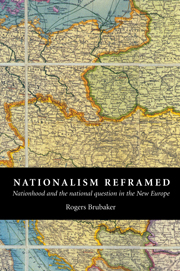Book contents
- Frontmatter
- Contents
- Acknowledgments
- Introduction
- Part I Rethinking nationhood and nationalism
- Part II The old “New Europe” and the new
- 4 Nationalizing states in the old “New Europe” – and the new
- 5 Homeland nationalism in Weimar Germany and “Weimar Russia”
- 6 Aftermaths of empire and the unmixing of peoples
- Bibliography
- Index
6 - Aftermaths of empire and the unmixing of peoples
Published online by Cambridge University Press: 06 July 2010
- Frontmatter
- Contents
- Acknowledgments
- Introduction
- Part I Rethinking nationhood and nationalism
- Part II The old “New Europe” and the new
- 4 Nationalizing states in the old “New Europe” – and the new
- 5 Homeland nationalism in Weimar Germany and “Weimar Russia”
- 6 Aftermaths of empire and the unmixing of peoples
- Bibliography
- Index
Summary
Migration has always been central to the making, unmaking, and remaking of states. From the polychromatic political landscapes of the ancient world, with their luxuriant variety of forms of rule, to the more uniform terrain of the present, dominated by the bureaucratic territorial state, massive movements of people have regularly accompanied – as consequence and sometimes also as cause – the expansion, contraction, and reconfiguration of political space.
This centrality of migration to political expansion, contraction, and reconfiguration is amply illustrated in the history of the Russo-Soviet state. “The history of Russia,” wrote Vasilii Kliuchevskii, dean of nineteenth-century Russian historians, “is the history of a country which colonizes itself.” That colonization began in the mid-sixteenth century, when conquest of the Kazan and Astrakhan khanates permitted Russian peasant settlement to expand into the fertile black earth zone heretofore controlled by hostile Turkic nomads. It did not end until the postwar decades of the twentieth century, when industrial and agricultural development strategies drew large numbers of Russians to peripheral regions, most dramatically, in terms of ethnodemographic consequences, to Kazakhstan, Estonia, and Latvia. Throughout these four centuries, the eastward, southward, and (more recently) westward dispersion of Russians from their initially small region of core settlement has been intimately linked to the expansion and consolidation of the Russian state and its Soviet successor. It has comprised one of the greatest episodes of colonization in human history.
- Type
- Chapter
- Information
- Nationalism ReframedNationhood and the National Question in the New Europe, pp. 148 - 178Publisher: Cambridge University PressPrint publication year: 1996
- 2
- Cited by



